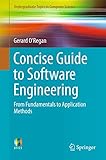Concise guide to software engineering [electronic resource] : from fundamentals to application methods / Gerard O'Regan.
Material type: TextSeries: Undergraduate topics in computer sciencePublisher: Cham : Springer, [2017]Copyright date: ℗♭2017Description: xxiv, 331 pages : Illustrations ; 23 cmContent type:
TextSeries: Undergraduate topics in computer sciencePublisher: Cham : Springer, [2017]Copyright date: ℗♭2017Description: xxiv, 331 pages : Illustrations ; 23 cmContent type: - text
- unmediated
- volume
- 3319577492
- 9783319577494
- 005.1 23
- QA76.758
| Item type | Current library | Call number | Status | Date due | Barcode | |
|---|---|---|---|---|---|---|
| E-Resources | Main Library E-Resources | 005.1 Or66 (Browse shelf(Opens below)) | Available | E000281 |
Browsing Main Library shelves, Shelving location: E-Resources Close shelf browser (Hides shelf browser)
Includes bibliographical references and index.
Background -- Software Project Management -- Requirements Engineering -- Software Design and Development -- Configuration Management -- Software Inspections -- Software Testing -- Supplier Selection and Management -- Software Quality Assurance -- Software Metrics and Problem Solving -- Software Reliability and Dependability -- Formal Methods -- Z Formal Specification Language -- Unified Modeling Language -- Software Process Improvement -- Capability Maturity Model Integration -- Software Engineering Tools -- Agile Methodology -- A Miscellany of Innovation -- Epilogue.
This essential textbook presents a concise introduction to the fundamental principles of software engineering, together with practical guidance on how to apply the theory in a real-world, industrial environment. The wide-ranging coverage encompasses all areas of software design, management, and quality. Topics and features: Presents a broad overview of software engineering, including software lifecycles and phases in software development, and project management for software engineering Examines the areas of requirements engineering, software configuration management, software inspections, software testing, software quality assurance, and process quality Covers topics on software metrics and problem solving, software reliability and dependability, and software design and development, including Agile approaches Explains formal methods, a set of mathematical techniques to specify and derive a program from its specification, introducing the Z specification language Discusses software process improvement, describing the CMMI model, and introduces UML, a visual modelling language for software systems Reviews a range of tools to support various activities in software engineering, and offers advice on the selection and management of a software supplier Describes such innovations in the field of software as distributed systems, service-oriented architecture, software as a service, cloud computing, and embedded systems Includes key learning topics, summaries and review questions in each chapter, together with a useful glossary This practical and easy-to-follow textbook/reference is ideal for computer science students seeking to learn how to build high quality and reliable software on time and on budget. The text also serves as a self-study primer for software engineers, quality professionals, and software managers.
There are no comments on this title.








